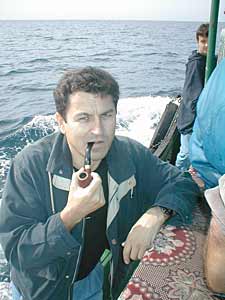
Working to discern patterns of environmental disinformation in an online world
For the past eight years, disinformation has dominated news around elections all over the world. Despite this, it is still a widely misunderstood con...
News

Publish date: September 10, 2001
Written by: Jon Gauslaa
News
The handwriting experts were called in to evaluate whether two signatures in the protocol from the search of Pasko’s flat in November 1997 were falsified or not. At the first Pasko-trial in 1999 two of the witnesses that apparently had signed the search protocol claimed that their signatures had been falsified. This time, one of them said that the signature in the protocol was his and thus, an expert evaluation of their handwriting had to be carried out.
Falsified signatures
After both witnesses had given their signatures in Court, the experts compared these signatures with the ones in the protocol, and their conclusion was clear: The signatures in the protocol of the search and the signatures that were given in court, are not made by the same persons.
– This confirms that the signatures in the protocol were falsified, said defender Ivan Pavlov. We will use the expert-conclusion as one of our arguments for substantiating that the protocol from the search must be disqualified as evidence and that the search was carried out illegally.
– This is only allegations, said Ivan Pavlov. We drew the Court’s attention to the fact that loose and unsubstantiated allegations hinting that this or that person works for foreign intelligence, by no means can be considered as evidence in a criminal case. The attorney also said that the defence had pointed out that there were no traces in the case files of requests from the FSB to the SVR asking for the said materials. – It is a mystery how these documents got into the case files, and we hope that the Court will give an adequate evalution of this, he said.
*****
Journalist Grigory Pasko was arrested on November 21, 1997 on charges of espionage on behalf of the Japanese TV-station ‘NHK’. He was acquitted of espionage in July 1999, but found guilty of abuse of office and freed under a general amnesty. Seeking a full acquittal, Pasko appealed the verdict, but so did the prosecution, insisting he was a spy. The Military Collegium of the Russian Supreme Court cancelled the verdict in November 2000, and sent the case back to Vladivostok for a re-trial. After a number of postponements the re-trial started on July 11, 2001.

For the past eight years, disinformation has dominated news around elections all over the world. Despite this, it is still a widely misunderstood con...

A ruling by the European Free Trade Association Court that Norway’s continental shelf falls under the European Economic Area Agreement could dramatic...

Bellona held a seminar on countering Russian disinformation in the Arctic at the Arctic Frontiers international conference in Norway

Our December Nuclear Digest, reported by Bellona’s Environmental Transparency Center, is out now. Here’s a quick taste of three nuclear issues arisin...